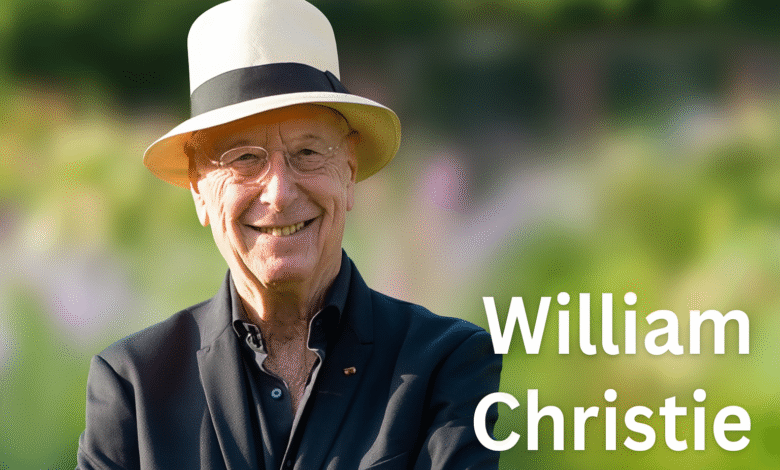William Christie: The Maestro Who Revived French Baroque Music
Exploring the Life, Legacy, and Timeless Impact of a Harpsichord Virtuoso and Visionary Conductor

Introduction
William Christie is a name that resonates profoundly within the world of classical music, particularly in the domain of historically informed Baroque performance. An American-born conductor, harpsichordist, and educator who later adopted French nationality, Christie has played a monumental role in the rediscovery and revitalization of 17th and 18th-century French music. With the founding of his ensemble, Les Arts Florissants, and decades of mentorship to young musicians worldwide, his legacy is both artistic and educational. This article explores the remarkable life and achievements of William Christie, a visionary who made forgotten music come alive again.
Quick Bio
| Attribute | Details |
|---|---|
| Full Name | William Lincoln Christie |
| Date of Birth | December 19, 1944 |
| Birthplace | Buffalo, New York, USA |
| Nationality | American (French citizen since 1995) |
| Education | Harvard University, Yale University |
| Profession | Conductor, Harpsichordist, Educator |
| Known For | Founding Les Arts Florissants |
| Active Years | 1971–present |
William Christie was born on December 19, 1944, in Buffalo, New York. From an early age, he was immersed in a musically enriched environment. His mother, a choir director, nurtured his interest in classical music and guided him toward his first steps with the piano and organ. The sounds of Bach and Handel during church services ignited a lifelong passion for Baroque music.
Christie’s academic journey began at Harvard University, where he earned a degree in art history in 1966. While there, he developed his skills as a conductor and musician, serving briefly as assistant conductor of the Harvard Glee Club. He continued his education at Yale University, where he pursued a Master of Music, focusing on harpsichord and musicology. His time at Yale, studying under Ralph Kirkpatrick, solidified his devotion to historical performance practice.
Starting His Career and Moving to France
Following his studies, Christie held a teaching post at Dartmouth College, where he led the Collegium Musicum. However, his contract was not renewed, and he sought opportunities abroad. His opposition to the Vietnam War and the political climate in the United States led him to relocate to Europe in 1971. He first moved to the United Kingdom before settling in France.
France offered Christie a platform to explore his passion for early music. He joined the Five Centuries Ensemble and later collaborated with René Jacobs’ Concerto Vocale. These experiences introduced him to like-minded musicians and furthered his understanding of authentic Baroque interpretation.
Founding Les Arts Florissants
In 1979, William Christie founded Les Arts Florissants, an ensemble dedicated to reviving and performing French Baroque music using period instruments. The group took its name from an opera by Marc-Antoine Charpentier, reflecting its mission to resurrect forgotten works from 17th and 18th-century France.
The turning point for Les Arts Florissants came in 1987 with their critically acclaimed production of Atys by Jean-Baptiste Lully at the Opéra-Comique in Paris. This production was hailed as a revival of French musical heritage and brought Christie international acclaim. The ensemble went on to perform across the globe, earning a reputation for excellence and authenticity.
A Celebrated Career in Baroque Music
William Christie’s musical focus remained anchored in Baroque composers such as Rameau, Lully, Charpentier, Monteverdi, and Handel. He expanded his repertoire to include Mozart and Haydn, always applying historically informed techniques. Over the decades, he recorded more than 100 albums with Les Arts Florissants, winning awards like the Gramophone Record of the Year and the Grand Prix du Disque.
Christie was a frequent guest conductor at major opera houses and festivals, including Glyndebourne, the Berlin Philharmonic, the Metropolitan Opera, and the BBC Proms. His interpretations have shaped how audiences and musicians alike perceive French Baroque music today.
Teaching, Mentoring, and Educational Contributions
Beyond performance, Christie has dedicated a significant part of his life to teaching and mentoring. From 1982 to 1995, he served as a professor of early music at the Paris Conservatory, becoming the first American to hold such a post. His pedagogical influence extended further with the establishment of Le Jardin des Voix in 2002, a vocal academy designed to train young singers in Baroque style.
In 2007, Christie began teaching at The Juilliard School in New York as a visiting artist, continuing to shape future generations of musicians. His approach emphasizes precision, authenticity, and emotional expression, hallmarks of the Baroque era.
The Gardens of Thiré and Cultural Legacy
William Christie is not only known for his music but also for his deep appreciation of French art and culture. In 1985, he purchased a historic estate in Thiré, in the Vendée region of France. There, he created elaborate French-style gardens that now serve as a cultural venue for music and art.
In 2012, he launched the annual festival “Dans les Jardins de William Christie”, combining outdoor concerts with garden tours. This fusion of nature and music has become a unique cultural experience, reflecting Christie’s holistic approach to beauty and history.
Honors, Recognition, and Foundation
Christie’s contributions have earned him some of France’s highest honors. He became a French citizen in 1995 and was appointed a Commander of the Légion d’honneur, later rising to Grand Croix of the Ordre national du Mérite. In 2008, he was elected to the prestigious Académie des Beaux-Arts, succeeding mime legend Marcel Marceau.
In 2017, he solidified his legacy by establishing the Fondation William Christie – Les Arts Florissants, donating his estate to support ongoing music education, historical preservation, and artistic creation.
Latest Projects and Ongoing Influence
In 2024, William Christie celebrated his 80th birthday, with gala concerts and renewed recognition of his life’s work. The 2024–2025 season features a revival of Rameau’s Les Fêtes d’Hébé, staged in a contemporary setting to highlight its timeless themes. Christie remains active as the artistic director of Les Arts Florissants and continues teaching at Juilliard.
Even at 80, his energy and commitment to Baroque music remain undiminished. His performances are still lauded for their clarity, emotional depth, and scholarly rigor, proving his relevance in both historical and modern contexts.
Legacy and Impact on the Music World
William Christie’s impact extends far beyond the concert stage. He has redefined how the world hears and performs Baroque music. Through his ensembles, recordings, teaching, and festivals, he has nurtured a global community of musicians devoted to authentic performance.
His blend of artistic vision, historical scholarship, and human warmth has made him not only a master conductor but also a cultural ambassador. Christie’s legacy lives on in the voices of his students, the music revived under his baton, and the gardens of Thiré that sing with sound each summer.
Frequently Asked Questions (FAQ)
Q1: What is William Christie best known for?
A: He is best known for founding Les Arts Florissants and reviving French Baroque music using period instruments and authentic interpretation.
Q2: What is Le Jardin des Voix?
A: It is a vocal academy established by Christie in 2002 to mentor young singers in the Baroque tradition.
Q3: Where does William Christie live now?
A: He resides in Thiré, Vendée, France, where he also hosts a Baroque music festival in his gardens.
Q4: Is William Christie still active in music?
A: Yes, he continues to perform, teach, and direct, including recent productions and teaching at Juilliard.
Q5: William Christie still Alive?
Yes, William Christie is still alive. As of today, he is 80 years old, born on December 19, 1944.
Q6: What sets William Christie apart from other conductors?
A: His deep historical knowledge, precision with period instruments, and passion for French Baroque repertoire distinguish him globally.



